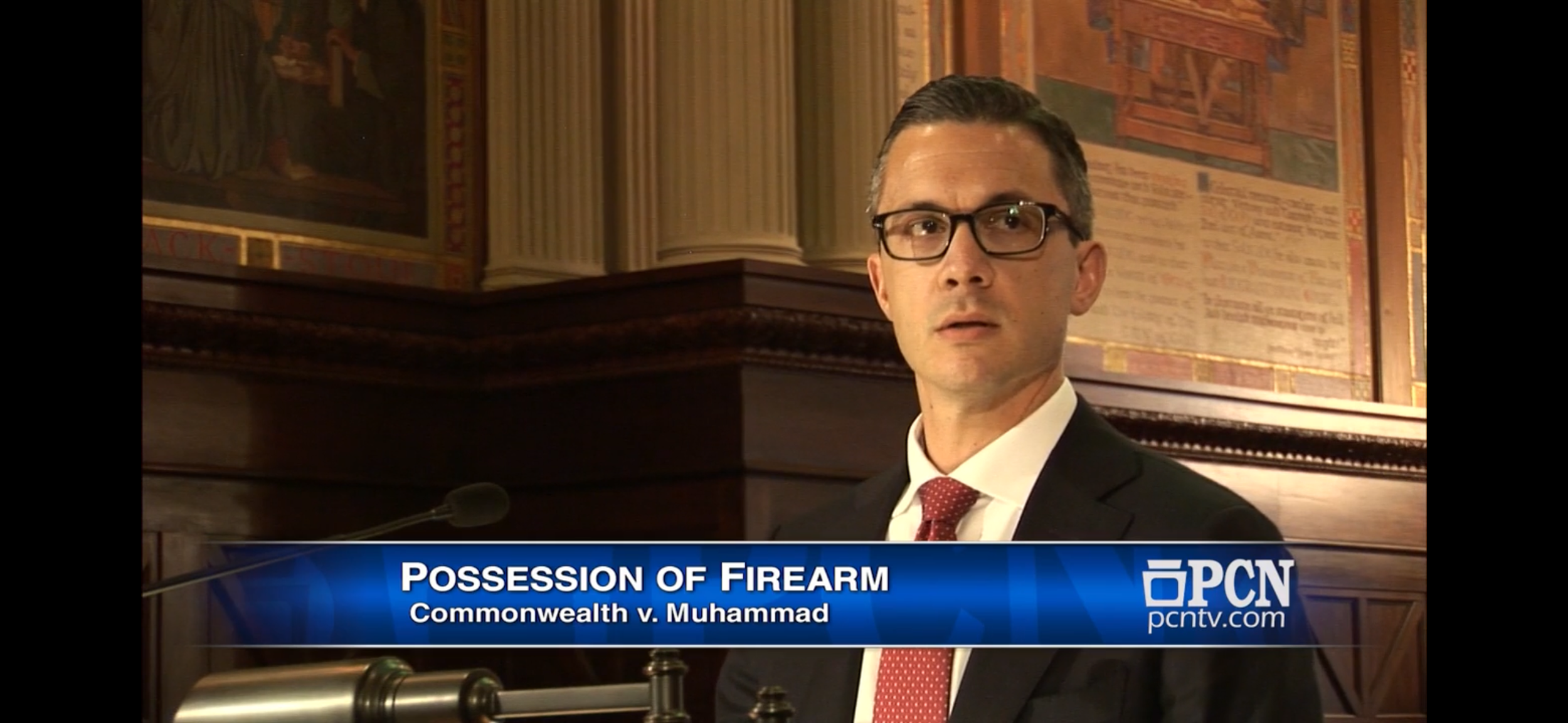
Philadelphia Criminal Defense Blog
PA Superior Court: A Defendant Can Conspire to Commit Second-Degree Murder
Philadelphia Criminal Defense Lawyer Zak T. Goldstein, Esquire
The Pennsylvania Superior Court has decided the case of Commonwealth v. Wellman, holding that conspiracy to commit second-degree murder is a cognizable offense under Pennsylvania law. The Court held both that the offense exists in Pennsylvania and that the evidence was sufficient to uphold the defendant’s conviction.
The Facts of Wellman
The case arose out of a violent robbery which occurred on October 5, 2019, in Philadelphia. The Commonwealth alleged that the defendant and his brother entered an apartment, brandishing a handgun and what appeared to be a rifle. They robbed several occupants of their wallets, phones, and valuables. When the decedent resisted, the defendant pressed a handgun to the decedent’s head and fatally shot him. Police later apprehended the brothers in a nearby alley. The police recovered stolen items, discarded clothing, and a revolver with gunshot residue in it.
The police arrested the defendant, and prosecutors charged him with second-degree murder, robbery, conspiracy, and firearms offenses. He went to trial, and the jury found him guilty. He received a mandatory life-without-parole sentence for the murder, as well as a consecutive five-to-ten year sentence for robbery.
The Superior Court Appeal
On appeal, the defendant’s attorney initially filed an Anders brief, which is a brief indicating that the attorney did not think the defendant had a single viable appeal issue. These should almost never be filed following a trial, especially in a murder case. Accordingly, the Superior Court rejected the Anders brief and directed the attorney to file a new brief for the appeal. The Superior Court had identified a potentially non-frivolous issue: whether the evidence was sufficient to convict the defendant of conspiracy to commit second-degree murder. In a new brief, the defendant argued that he and his brother only agreed to commit a robbery, not murder. The Commonwealth actually went further and argued in its brief that conspiracy to commit second-degree murder is not even a cognizable crime, meaning it does not exist. The Commonwealth did not move to vacate the substantive murder conviction, but it did argue that the Court should vacate the conspiracy conviction.
The Superior Court’s Ruling
The Superior Court rejected both positions:
Sufficiency of the Evidence: The Court held that the robbery agreement, carried out with firearms and escalating violence, supported the inference that the brothers entered into a conspiracy that encompassed second-degree murder. Even without an express plan to kill, the inherently dangerous felony and Wellman’s use of a firearm made the risk of death foreseeable.
Cognizability of the Offense: Relying on the Pennsylvania Supreme Court’s decision in Commonwealth v. Fisher, 80 A.3d 1186 (Pa. 2013), the Court concluded that conspiracy to commit second-degree murder is a legally valid offense. Just as one can conspire to commit third-degree murder or involuntary manslaughter, one can conspire to commit felony murder by agreeing to engage in conduct that carries a wanton disregard for life.
The Court therefore affirmed Wellman’s life sentence and rejected the Commonwealth’s somewhat unexpected argument to vacate the conviction.
Takeaway
This decision settles an open question in Pennsylvania law: conspiracy to commit second-degree murder is a cognizable offense. Defendants charged under this theory cannot avoid liability by arguing that felony murder is “unintentional.” If conspirators agree to commit a dangerous felony like armed robbery, they may be held liable not just for the robbery, but also for any resulting deaths. This is true even where no specific intent to kill is proven.
Facing criminal charges or appealing a criminal case in Pennsylvania?
Goldstein Mehta LLC Defense Attorneys
If you are facing criminal charges or under investigation by the police, we can help. We have successfully defended thousands of clients against criminal charges in courts throughout Pennsylvania and New Jersey. We have successfully obtained full acquittals and dismissals in cases involving charges such as Conspiracy, Aggravated Assault, Rape, Violations of the Uniform Firearms Act, and First-Degree Murder. We have also won criminal appeals and PCRAs in state and federal court, including the successful direct appeal of a first-degree murder conviction and the exoneration of a client who spent 33 years in prison for a murder he did not commit. Our award-winning Philadelphia criminal defense lawyers offer a free criminal defense strategy session to any potential client. Call 267-225-2545 to speak with an experienced and understanding defense attorney today.
United States Supreme Court To Review Whether Police Need Warrant To Obtain Cell Phone Location Data
Potentially recognizing that the frame work for when police and federal agents are required to seek a search warrant to obtain digital information has become outdated, the United States Supreme Court announced that it will review whether the police are required to get a search warrant in order to obtain a suspect’s cell phone records. Local and federal law enforcement routinely seek cell phone location data from a suspect’s telephone company in order to track the suspect’s whereabouts around the time of the crime. The location data can be extremely powerful as circumstantial evidence in cases where the cell phone data puts the suspect at or near the scene of the crime at the time of its commission. For example, if police believe that the suspect committed a homicide, they could use cell phone location data to show that the suspect was near the decedent at the time of the murder.
Current Standards for Obtaining Cell Phone Location Data
Under existing state and federal law, police officers are generally not required to obtain a search warrant in order to retrieve this information from a phone company. Instead, in many jurisdictions, law enforcement officers simply submit a request to the phone company, and the phone company will provide the information without a warrant and court order. In other jurisdictions, officers may be required to obtain a court order in order to retrieve the data, but the court orders may be issued on a standard of evidence lower than the probable cause standard required in order to obtain an actual search warrant. This is the case in federal court, where prosecutors must show only that there are “reasonable grounds” for the records and that they are “relevant and material” to an investigation.
Courts have traditionally allowed police to dispense with the warrant requirement in obtaining this type of data because the data is not stored in the suspect’s phone or on the suspect’s person. Instead, the defendant necessarily shared the data with a third-party, the phone company, by using the phone. Thus, courts have held that defendants do not have a reasonable expectation of privacy in information that they have publicly shared or shared with third parties, and courts have not needed to obtain search warrants in order to obtain that type of information.
Reasonable Expectation of Privacy in Cell Phone Data
As a general rule, defendants may move to suppress the results of a search only where they had a reasonable expectation of privacy in the place searched. Obviously, you have a reasonable expectation of privacy in your home, car, and pockets, but courts have rejected the idea that a criminal defendant has a reasonable expectation of privacy in something that he or she has shared with a third party. This rule may have made sense twenty years ago before the advent of technology which literally tracks a person’s every movement. Devices like cell phones, sports watches, and GPS systems all track a person’s whereabouts at all times, making it much more difficult for the government to argue that a suspect should not have a privacy interest in the resulting data. If the government is not required to obtain a search warrant, then the government can essentially obtain all of the details of a person’s life without even having probable cause.
After recently determining that police must have a search warrant in order to search the contents of an arrestee’s search warrant, this case suggests that the High Court may be prepared to re-think the reasonable expectation of privacy doctrine given the realities of modern technology. The case on appeal is Carpenter v. United States. In Carpenter, without getting a search warrant which would have required probable cause, FBI agents obtained cell phone records for the defendant from his phone company which covered 127 days and revealed 12,898 separate points of location data. The data ultimately connected Carpenter to a string of cell phone store robberies, and Carpenter was convicted at trial. On appeal, the Sixth Circuit Court of Appeals ruled 2-1 that the Fourth Amendment does not require law enforcement to obtain a search warrant prior to seeking this type of data. Carpenter has appealed to the United States Supreme Court, and the Court will review whether the police should be required to obtain a search warrant in order to get this highly personal data. Search warrants are not particularly difficult for the government to obtain, and a decision in favor of Carpenter would limit the government’s ability to track your every movement without at least some showing of probable cause.
Award-Winning Philadelphia Criminal Defense Lawyers
Philadelphia Criminal Lawyers Demetra Mehta and Zak T. Goldstein
If you are facing criminal charges, we can help. Our Philadelphia criminal defense lawyers have successfully defended thousands of clients against a wide variety of criminal charges in preliminary hearings and at trial. Call 267-225-2545 for a complimentary 15-minute criminal defense strategy session with one of our award-winning defense attorneys.
Read the Sixth Circuit’s Opinion: https://scholar.google.com/scholar_case?case=14626167511079628834





